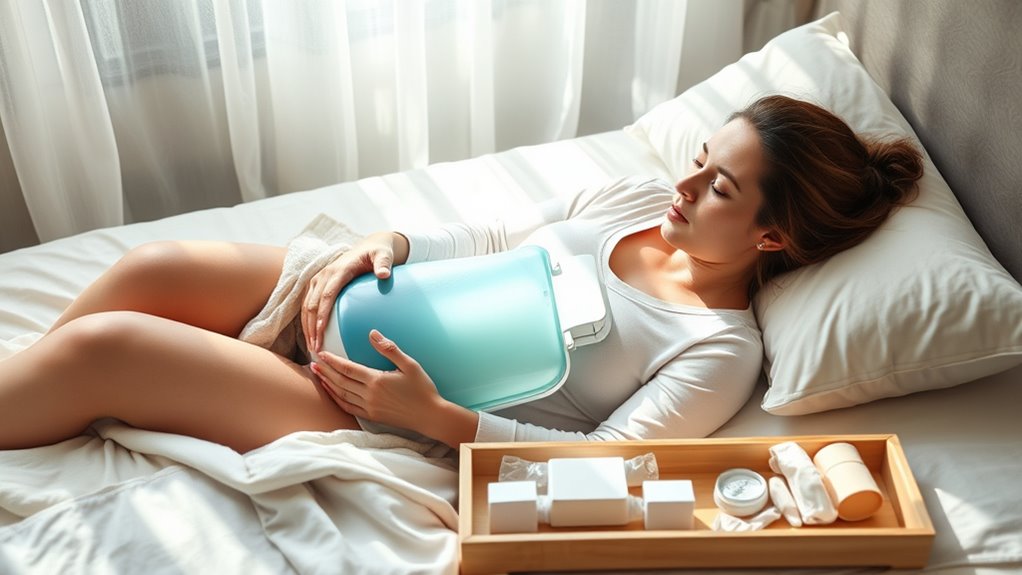To manage postpartum pain without opioids, focus on natural methods like applying cold packs to reduce swelling and discomfort, staying active with gentle movements or postpartum yoga to boost circulation, and practicing relaxation techniques such as deep breathing. You can also use over-the-counter options like NSAIDs or acetaminophen safely, stay well-hydrated, and try herbal remedies under your healthcare provider’s guidance. For more tips on comfortable recovery, continue exploring these effective strategies.
Key Takeaways
- Use cold packs and elevation to reduce swelling and numb postpartum pain safely without opioids.
- Engage in gentle movement, postpartum yoga, and physical therapy to promote circulation and healing.
- Utilize herbal remedies, deep breathing, and relaxation techniques to manage pain naturally.
- Stay well-hydrated and use over-the-counter NSAIDs or acetaminophen as recommended for mild to moderate pain.
- Employ proper breastfeeding positions and nipple care to alleviate discomfort without medication.
Understanding Post-Childbirth Pain and Its Causes

After giving birth, it’s common to experience pain, but understanding its causes can help you manage it more effectively. Your body undergoes many changes, and pain can stem from various sources. For example, uterine contractions continue after delivery to shrink your uterus back to normal size, causing cramping. Tears or incisions from tearing or a cesarean section can lead to localized pain and discomfort. Stretching of vaginal tissues during labor may also cause soreness. Additionally, hormonal shifts can influence pain sensitivity. Inflammation and swelling in the perineal area contribute to soreness, especially if stitches are involved. Recognizing these sources helps you better understand what you’re feeling and guides you toward appropriate relief strategies that don’t rely on opioids. Emerging automation technologies in healthcare are also being explored to improve postpartum pain management options.
The Benefits of Non-Opioid Pain Relief Options

Non-opioid pain relief options offer many benefits, making them an effective choice for managing postpartum discomfort. They reduce the risk of dependency and side effects often associated with opioids, helping you recover safely. These methods typically have fewer adverse effects, such as drowsiness or nausea, allowing you to stay alert and connected with your baby. Non-opioid options can be tailored to your specific needs, whether through medications, physical therapy, or natural remedies. They also promote quicker recovery by minimizing potential complications linked to opioid use. Plus, using these alternatives encourages a more holistic approach to pain management, empowering you to participate actively in your healing process. Incorporating mindfulness techniques can further enhance pain management by promoting relaxation and reducing stress. Overall, non-opioid options support a safer, more comfortable postpartum experience.
Using Cold Therapy to Reduce Swelling and Discomfort

Cold therapy is an effective way to reduce swelling and discomfort in the postpartum period. Applying cold packs can help numb pain and decrease inflammation, making recovery more manageable. To maximize benefits, use a barrier like a cloth between the cold pack and your skin, and limit application to 15-20 minutes at a time. Consistency is key for swelling reduction and pain relief. Here’s a quick guide:
| Cold Pack Type | Application Tips | Duration |
|---|---|---|
| Gel packs | Wrap in cloth | 15-20 mins |
| Ice bags | Use with a barrier | 15-20 mins |
| Frozen vegetables | Keep in cloth | 15-20 mins |
| Cold compresses | Elevate area | 15-20 mins |
| Cold packs | Rest and repeat | As needed |
Using cold therapy helps you feel more comfortable and supports healing during this recovery phase. Automated insights from data analysis can also help monitor your recovery progress and tailor your pain management approach.
The Role of Gentle Movement and Physical Therapy

Gentle movement and targeted physical therapy play a crucial role in postpartum recovery by promoting blood circulation, reducing stiffness, and strengthening muscles. Moving carefully helps prevent blood clots and speeds healing, especially in your pelvic area. Activities like walking, gentle stretching, or postpartum yoga can ease discomfort and improve flexibility. Physical therapy focuses on restoring core strength, alleviating back pain, and supporting pelvic health. You might work with a specialist to develop personalized exercises that suit your recovery stage. Consistent, gentle activity keeps your muscles active without overexerting them. Remember, listening to your body is key—avoid pushing through pain. Incorporating mindfulness practices can further enhance your recovery process. Over time, these practices help regain strength, improve posture, and promote overall well-being, making your postpartum journey smoother and more comfortable.
Incorporating Herbal and Natural Remedies Safely

Incorporating herbal and natural remedies into your postpartum pain management can be beneficial, but it’s vital to do so safely. Always consult your healthcare provider before trying new remedies to avoid adverse interactions or side effects. Stick to reputable sources and avoid unverified products. Start with small doses to monitor your body’s response. Be aware of any allergies or sensitivities. Keep track of any changes in your symptoms and report them to your provider. Remember, natural doesn’t always mean safe or effective for everyone.
Here are some safe considerations:
- Use herbs like ginger or turmeric for inflammation
- Avoid herbs known to affect milk production without guidance
- Choose high-quality, certified supplements
- Watch for signs of allergic reactions
- Never replace medical advice with self-treatment
- Regular use of certain natural remedies can also support Glycolic Acid Benefits for Skin and promote overall healing.
Relaxation Techniques and Mind-Body Practices

Relaxation techniques and mind-body practices can be powerful tools for managing postpartum pain, helping you reduce stress and promote healing. Deep breathing exercises, for example, calm your nervous system and lessen pain sensations. Guided imagery or visualization allows you to focus your mind on soothing scenes, easing discomfort. Mindfulness meditation encourages present-moment awareness, helping you accept pain without resistance. Gentle practices like yoga or stretching can improve circulation and relieve tension. Incorporating these techniques into your daily routine can make a noticeable difference in how you experience pain and stress. They’re accessible and can be tailored to your comfort level. Regular practice can also enhance emotional well-being, supporting a positive postpartum recovery. By practicing regularly, you support your body’s natural healing processes and create a sense of calm during your postpartum recovery.
The Importance of Adequate Rest and Hydration

Getting enough rest helps your body heal faster and reduces post-birth discomfort. Staying hydrated keeps your energy levels up and lowers the risk of complications. Prioritizing both can make your recovery smoother and more comfortable. Incorporating skin protection strategies can further minimize discomfort and promote healthier healing.
Rest Enhances Recovery
Adequate rest and hydration are essential for postpartum recovery, as they help your body heal and regain strength. When you rest, your body can repair tissues, reduce fatigue, and support healing processes. Hydration keeps your tissues pliable, flushes out toxins, and prevents dehydration-related complications. Prioritize sleep whenever possible, even if it means napping during the day. Proper hydration can minimize headaches, dizziness, and muscle cramps. Remember, your recovery depends on taking care of yourself so you can care for your baby effectively. Ensuring that your sleep environment is comfortable and conducive to rest can also enhance your recovery.
Hydration Prevents Complications
Proper hydration plays a vital role in preventing postpartum complications. When you stay well-hydrated, your body can recover more efficiently, supporting healing and reducing the risk of issues like dehydration or low blood pressure. Adequate fluids help maintain your energy levels, prevent dizziness, and keep your milk supply steady if you’re breastfeeding. Dehydration can also lead to headaches, muscle cramps, or fatigue, which hinder your recovery. Drinking enough water and electrolytes replenishes lost fluids during labor and delivery. Listen to your body’s thirst signals and aim for consistent fluid intake throughout the day. Keeping yourself hydrated promotes better healing, reduces discomfort, and helps you regain strength faster in the postpartum period. Recognizing signs of dehydration early can further aid in preventing potential complications.
Over-the-Counter Pain Relievers: What’s Safe and Effective

When choosing over-the-counter pain relievers, it’s vital to know which options are safe for you after childbirth. Following proper dosage guidelines helps prevent complications and guarantees effective relief. Always check with your healthcare provider before taking any medication to stay safe. Additionally, understanding how AI can assist in healthcare decision-making emphasizes the importance of reliable information and safety measures. AI-driven diagnostics can support personalized treatment plans, but it’s crucial to rely on verified data to ensure safe postpartum pain management.
Safe OTC Options
Are over-the-counter pain relievers safe to use after giving birth? Generally, yes—when chosen carefully and used as directed. You want options that effectively reduce pain without risking your health or your baby’s. Nonsteroidal anti-inflammatory drugs (NSAIDs), like ibuprofen, are often recommended because they help with swelling and discomfort and are safe for most new mothers. Acetaminophen (Tylenol) is another common choice for mild to moderate pain relief. However, always check with your healthcare provider before use. Keep an eye on these key points:
- Ibuprofen helps reduce pain and inflammation
- Acetaminophen is gentle on your stomach
- Avoid aspirin unless advised by your doctor
- Read labels carefully for dosage instructions
- Never combine OTCs without medical guidance
Proper Dosage Guidelines
To guarantee safe and effective pain relief after childbirth, it’s essential to follow the correct dosage guidelines for over-the-counter medications. Always read the label carefully before taking any medication, and adhere to the recommended dose. Taking more than directed can increase your risk of side effects or complications, while taking less may not provide adequate relief. Keep track of the timing between doses, and don’t double up if pain persists—consult your healthcare provider instead. Be aware of any other medications you’re taking to avoid accidental overdose, especially with ingredients like acetaminophen or NSAIDs. If you have questions or experience side effects, reach out to your healthcare provider promptly. Proper dosage ensures safe, effective pain management without unnecessary risks.
Strategies for Breastfeeding and Pain Management

Breastfeeding can sometimes cause discomfort or pain, but adopting effective strategies can make the experience more comfortable and sustainable. To ease pain and promote a better latch, try different positions that reduce strain on sore areas. Keep your baby’s mouth wide open to latch deeply, ensuring effective feeding. Use warm compresses or cold packs to soothe sore nipples and reduce inflammation. Maintaining proper hydration and nutrition supports healing and milk production. Avoid overly tight clothing that can irritate sensitive skin. Lastly, consider nipple creams or ointments designed for breastfeeding to protect and heal cracked or sore nipples. These simple steps can help you manage discomfort naturally, making breastfeeding a positive experience for both you and your baby.
When to Seek Medical Advice for Persistent Pain

If you notice pain that doesn’t improve or feels unusual, it’s time to seek medical advice. Pay attention to when the pain starts and how long it lasts, as persistent discomfort may indicate a problem. Don’t wait too long if the pain worsens or is accompanied by other symptoms—prompt help can prevent complications.
Recognizing Unusual Pain
While some discomfort after giving birth is normal, persistent or unusual pain shouldn’t be overlooked. Recognizing when pain is abnormal helps you seek timely medical advice. Look out for sharp, stabbing, or worsening pain that doesn’t improve with rest or home remedies. If you experience intense pain that feels different from typical postpartum discomfort, it’s a sign to see a healthcare professional. Unusual symptoms like fever, foul-smelling discharge, or swelling that doesn’t go down also require attention. Trust your instincts—if something feels off or more severe than expected, don’t hesitate to get checked. Remember, early intervention can prevent complications and ensure proper healing. Your body’s signals are important—listen to them and seek help when needed.
Timing for Medical Help
Monitoring your postpartum pain is vital, especially when it persists beyond the usual timeframe or worsens over time. If your pain lasts longer than a week or intensifies instead of improving, it’s time to seek medical advice. Persistent or worsening pain could indicate an infection, bleeding, or other complications that need prompt attention. Trust your instincts—if something feels off or you’re unable to manage the pain with home methods, don’t hesitate to contact your healthcare provider. Symptoms like fever, foul-smelling discharge, severe cramping, or pain that radiates to other areas also warrant immediate medical care. Timely intervention can prevent complications and ensure your recovery stays on track. Always prioritize your health and reach out when you’re unsure.
Frequently Asked Questions
Are There Specific Non-Opioid Medications Safe During Breastfeeding?
You’re wondering if certain non-opioid medications are safe while breastfeeding. Many options, like acetaminophen and ibuprofen, are generally safe for both you and your baby. Always check with your healthcare provider before taking any medication, especially if it’s new or combined with other drugs. They can recommend the best pain management strategies tailored to your needs, ensuring both your comfort and your baby’s safety.
How Can Partners Assist in Managing Postpartum Pain Naturally?
Think of your partner as a gentle lighthouse guiding you through rough waters. You can help manage postpartum pain naturally by offering warm compresses, encouraging gentle movement, and supporting relaxation techniques like deep breathing or guided imagery. You could also prepare nutritious meals, help with baby care, and create a calming environment. Your presence and practical help act as a soothing balm, making recovery easier and more comfortable for her.
What Mental Health Strategies Support Pain Tolerance and Recovery?
You can boost your pain tolerance and recovery by practicing mindfulness and deep breathing techniques, which help reduce stress and promote relaxation. Staying connected with loved ones offers emotional support, easing mental strain. Prioritize rest when possible, and engage in gentle activities like walking or stretching to boost your mood. Managing negative thoughts through positive affirmations also helps you stay resilient, making your recovery smoother and more manageable.
Can Dietary Changes Influence Postpartum Pain Levels?
Imagine you’re in a medieval apothecary, choosing herbs carefully. Dietary changes can indeed influence your postpartum pain levels. Eating anti-inflammatory foods like berries, leafy greens, and omega-3 rich fish may reduce inflammation and promote healing. Staying hydrated and maintaining balanced blood sugar levels also support pain management. While food isn’t a miracle cure, your diet plays a crucial role in your recovery, helping to ease discomfort naturally.
What Are Alternative Therapies Like Acupuncture for Postpartum Pain Relief?
You might wonder if therapies like acupuncture can help with postpartum pain relief. Acupuncture stimulates specific points to reduce pain and promote healing, often providing relief without medication. Many new moms find it beneficial for managing discomfort from muscle strain or perineal pain. While it’s not a cure-all, acupuncture can be a safe, natural option to explore alongside other non-opioid methods, helping you feel more comfortable during your postpartum recovery.
Conclusion
Think of postpartum pain management like tending a delicate garden—you nurture it with gentle care, patience, and natural remedies. When you listen to your body and use safe, non-opioid options, you help your recovery bloom. Remember, just as a garden needs time to flourish, your body needs rest and proper care. If pain persists, seek medical advice—your well-being is the most beautiful thing you can nurture.









